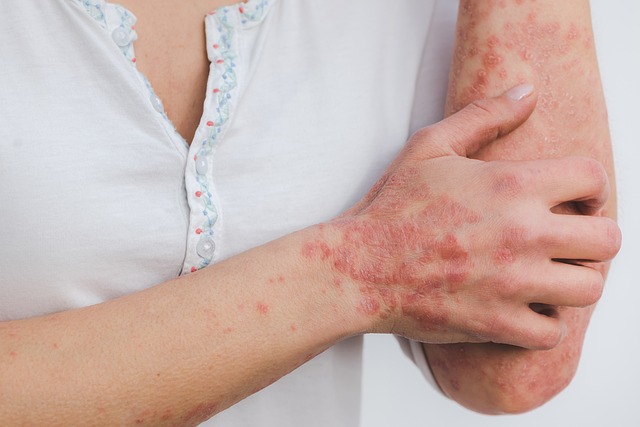Philippine Dermatological Society East Avenue Medical Center Dr. Lyra Laconico-Tumalad emphasized that psoriasis goes beyond the skin's surface, is not contagious, is not caused by poor hygiene, and can be controlled.

“Patient education is key to management; patients should take control of their diet and nutrition, focus on weight management, quit smoking, and engage in regular exercise, as these measures can be very helpful,” she said during the Department of Health (DOH) Kapihan with the Media for World Psoriasis Month Celebration on Oct. 27.
Tumalad also pointed out, "It doesn't stop at doctors advising the patient; we need to empower our patients, and the patients need to know how to manage their disease."
Psoriasis disease
"Psoriasis is chronic, meaning long-term, noncommunicable, immunologically mediated, multisystem disease, meaning it not only affects the skin but can also affect other organs of the body," she added.
The health expert underscored that this disease is characterized by skin inflammation and epidermal hyperplasia, explaining, "When you say skin inflammation, ito ay pamamaga sa balat at hyperplasia ay pagiging makapal (This is inflammation of the skin and hyperplasia is thickening)."
Patients with psoriasis, as stated by Tumalad, are at an increased risk of developing other diseases like painful, destructive arthritis, cardiovascular comorbidity, and even psychosocial challenges.
Based on worldwide epidemiological data, psoriasis affects about one to two percent of the population, and it is equally common among males and females.
Tumalad noted that psoriasis may begin at any age, most commonly between 15 and 30 years old, but it can also affect children and the elderly.
"Psoriasis is a multifactorial disease, so the cause can be inherited and influenced by environmental factors such as trauma, infection, and medications," she stated.
The expert stressed that there are many types of psoriasis, with chronic plaque psoriasis being the most common.
“This type is characterized by thick, red patches located in common sites like elbows and knees, the scalp, lower back, buttocks, trunk, shins, and forearms,” she stated.
Other types of psoriasis include inverse or intertriginous, pustular, and erythrodermic.
Tumalad mentioned other forms of psoriasis, including scalp psoriasis, involvement of the palms and soles, nail psoriasis, and childhood psoriasis.
She explained what happens to the skin in psoriasis and that it results from an accelerated skin production process.
In the case of healthy skin, the typical cycle takes about a month for shedding, but in a patient with psoriasis, it happens more quickly, occurring in just a few days.
“Let's say, in seven days, new skin forms, and the old skin no longer falls off. They don't have time to fall off because it happens quickly, and the rapid overproduction results in the accumulation of skin cells, causing them to pile up and thicken,” she pointed out.
The expert highlighted that stress, as well as weather factors, especially cold and dry conditions, some medications, tobacco use, skin injuries like cuts or sunburn, infections, alcohol, and obesity, can trigger psoriasis.
Psoriasis treatment
Tumalad, however, discussed the different treatment options available for psoriasis here in the Philippines, such as topical medications like corticosteroids, calcipotriol urea, and tar salicylic acid.
"Usually we give the topical medication for those with limited disease only, but for diseases that are severe, then we advise them of other modalities like systemic treatments, oral or injectable, and phototherapy," she stressed.
Psoriasis Philippines Organization
Moreover, the expert introduced the Psoriasis Philippines Organization, which plays a vital role in improving the situation of people with psoriasis in the country.

Peer support groups and social campaigns aim to increase awareness within society, foster community support, involve families, and enhance knowledge and self-efficacy to manage the condition.
Dr. Zharlah Gulmatico-Flores, the Vice Chair and Training Officer of the Department of Dermatology at the National Skin Center, Jose R. Reyes Memorial Medical Center, highlighted efforts to reduce the stigma associated with psoriasis in the country and educate the public about the condition.
She emphasized that information about programs and campaigns for public awareness and education can be found on the social media platforms of the Philippine Dermatological Society.
"Kami rin po ay nakikipagtulungan sa Psoriasis Philippines kung saan sila ay may mga programa katulad ng Psoriasis Walk this coming Oct. 29 para magbigay ng awareness para kababayan regarding sa ating mga pasyente na may psoriasis (We are also collaborating with Psoriasis Philippines, where they have programs like the Psoriasis Walk this coming October 29 to raise awareness among our fellow countrymen regarding patients with psoriasis)," Flores said. (Zekinah Elize Espina)